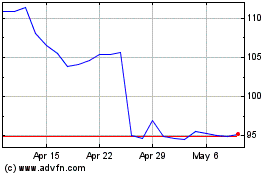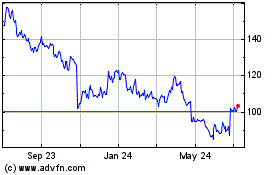Supreme Court Rejects Attempt by Whirlpool To Avoid Accountability For Allegedly Defective Washers
February 24 2014 - 12:19PM
Business Wire
Jonathan D. Selbin, chair of the defective products practice
group at the national plaintiffs’ law firm Lieff Cabraser Heimann
& Bernstein, LLP, announced today that the U.S. Supreme Court
this morning rejected an effort by Whirlpool Corporation (WHR) to
escape accountability for manufacturing millions of allegedly
defective washers that it sold to American families. Whirlpool
asked the Supreme Court to review the decision by the U.S. Court of
Appeals for the Sixth Circuit that allowed consumers to pursue
claims in a class action against Whirlpool for selling the
allegedly defective front-load washers from 2001 to 2008.
The consumers allege that the foreign-manufactured washers are
defective because they accumulate mold and require extraordinary
and expensive actions by consumers to reduce the effects of that
mold, such as running extra cleaning cycles, leaving the door open
between use, and wiping down the washer after every use with
bleach. They also allege that Whirlpool instructed them—only after
purchase—that they needed to routinely buy another product sold by
Whirlpool, Affresh™, to reduce the effects of the mold, at
substantial cost to consumers and profit to Whirlpool.
“Consumers brought this case to make this multi-billion-dollar
corporation stand behind its product,” Selbin said. “The federal
court of appeals, applying long-standing, fundamental legal
principles, twice unanimously sided with plaintiffs, holding that
they can sue Whirlpool for breach of warranty to get what they paid
for. We are pleased that the Supreme Court declined to intervene
and rejected Whirlpool’s baseless challenges to the rulings in the
case. Whirlpool’s latest attempt to escape accountability for its
defective products has failed.”
Selbin explained that “Whirlpool knew when it sold the very
first one of these washers that everything about their care and use
was different than the top load washers consumers used without
problem for decades— in Whirlpool’s own words, that these were ‘not
your mother’s washing machine.’”
“Instead of explaining that to consumers prior to purchase so
they could make an informed decision,” Selbin said, “Whirlpool
chose to hide that critical information until after the sale, and
then charged consumers for an entirely new and different product to
the tune of a couple hundred dollars each over the life of the
machine.” Selbin also said that when consumers complained to
Whirlpool, their warranty claims were denied: “Whirlpool refused to
stand behind its washers. Whirlpool left these families no choice
but to seek to hold Whirlpool accountable through the civil court
system. Despite years of procedural maneuverings by Whirlpool to
derail this case, the families will now finally get their day in
court.”
The lawsuit, Glazer v. Whirlpool Corporation, was originally
filed by a Cleveland, Ohio-area woman, Gina Glazer, who purchased a
defective Whirlpool Duet Sport washer in 2006. Shortly after her
purchase, Ms. Glazer’s washer developed mold and foul odors,
despite her extraordinary attempts to regularly clean her washer.
Ms. Glazer contacted Whirlpool and they refused to provide any
remedy. “We paid a lot of money for this machine and expected to
get a quality product for our family,” Glazer said. “Instead, we
got a machine that stunk up our home and stunk up my families’
clothes, including my young children’s clothes. Whirlpool should
stand behind their product and should be accountable when their
product fails to function as promised.”
In 2010, the federal District Court for the Northern District of
Ohio permitted the case filed by Ms. Glazer, along with the claims
filed by a Columbus, Ohio-area woman, Trina Allison, to go forward
as a class action on behalf of all Ohio purchasers of defective
Whirlpool front loading washers. Whirlpool appealed that decision
to the Sixth Circuit Court of Appeals in Cincinnati, Ohio. That
court has twice agreed with the district court that the case can
proceed as a class action on behalf of all purchasers of the
defective washers in Ohio. Today, the Supreme Court declined to
review that decision.
The Supreme Court also today declined to hear an appeal by Sears
Roebuck & Company (SHLD), made by consumers who purchased
Kenmore-branded washers from Sears identical to the washers in the
Whirlpool litigation. In that litigation, the Seventh Circuit Court
of Appeals agreed with consumers that they should be permitted to
move forward with their lawsuit in federal court in Illinois.
Consumers’ claims in the Sears case—that the Whirlpool-manufactured
Kenmore washers are defective—are similar to the claims in the
Whirlpool case.
“One-hundred percent of people who purchased these defective
Whirlpool and Kenmore machines, as alleged in our lawsuit, have
gotten something less than they paid for,” Selbin said. “According
to Whirlpool’s own records, just a few years after the Whirlpool
front loading washers were introduced in America, between 35% and
50% of consumers had already experienced foul odors,” Selbin said.
“Whirlpool should stand up and be accountable for the harm they
have caused to hard-working American families.”
In addition to the Whirlpool and Sears FLW class action cases,
the Supreme Court also denied a petition for writ of certiorari
against BSH Home Appliances Corporation, the manufacturer of Bosch
washing machines in Tait v. BSH Home Appliances Corp. In this case,
the Ninth Circuit Court of Appeals declined to review the trial
court’s grant of certification to four statewide consumer classes
in California, Illinois, Maryland, and New York. The Bosch
consumers, like the Whirlpool and Sears consumers, allege that
their machines are defective causing mold, mildew, and horrible
smells.
Learn more about the defective front-load washer litigation.
About Lieff Cabraser
Lieff Cabraser Heimann & Bernstein, LLP, is a sixty-plus
attorney law firm with offices in San Francisco, New York, and
Nashville. We are among the largest law firms in the United States
that represent only plaintiffs.
We are committed to achieving justice for consumers, employees,
patients, investors, and business owners; promoting safer products
and fair competition; protecting our environment; assisting
individuals blow the whistle on fraud; safeguarding the rights of
patent and copyright holders; and remedying violations of the civil
rights of citizens worldwide. Learn more at
www.lieffcabraser.com
Lieff Cabraser Heimann & Bernstein, LLPJonathan D. Selbin,
212-355-9500
Whirlpool (NYSE:WHR)
Historical Stock Chart
From Mar 2024 to Apr 2024

Whirlpool (NYSE:WHR)
Historical Stock Chart
From Apr 2023 to Apr 2024
